人教版(2019)选择性必修第一册Unit 2Looking into the Future Reading and Thinking 课件(共17张ppt,内嵌视频)
文档属性
| 名称 | 人教版(2019)选择性必修第一册Unit 2Looking into the Future Reading and Thinking 课件(共17张ppt,内嵌视频) | 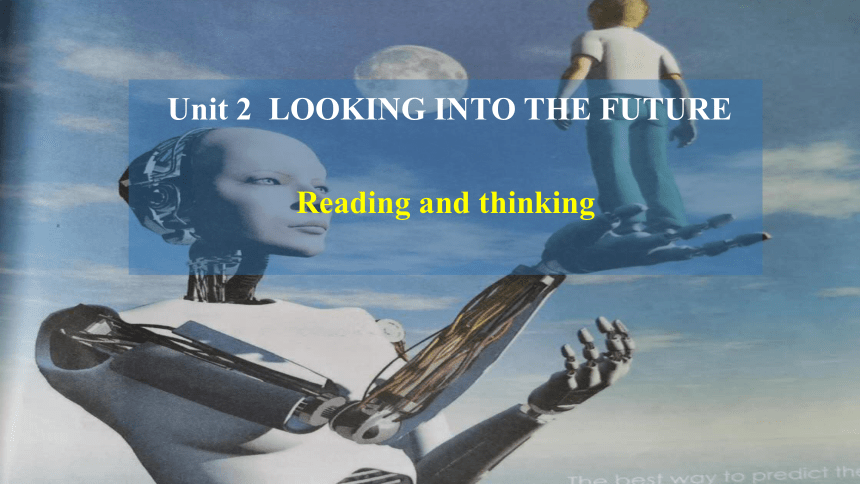 | |
| 格式 | pptx | ||
| 文件大小 | 22.8MB | ||
| 资源类型 | 教案 | ||
| 版本资源 | 人教版(2019) | ||
| 科目 | 英语 | ||
| 更新时间 | 2024-09-06 19:57:05 | ||
图片预览

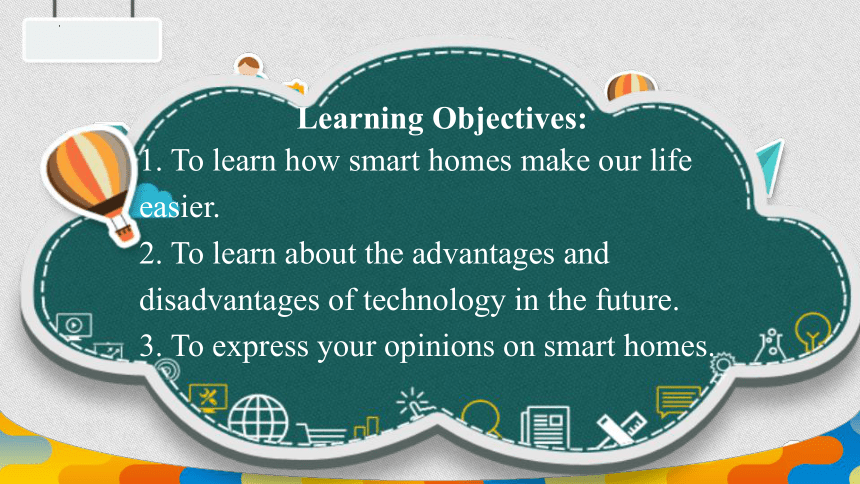
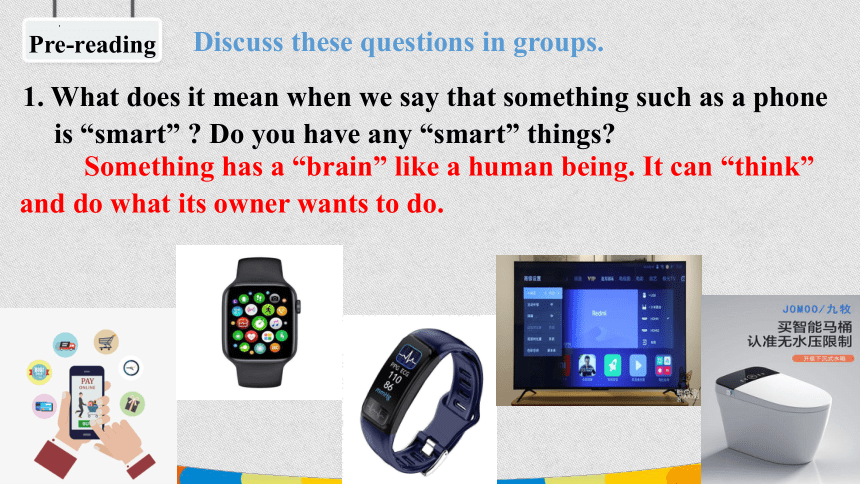
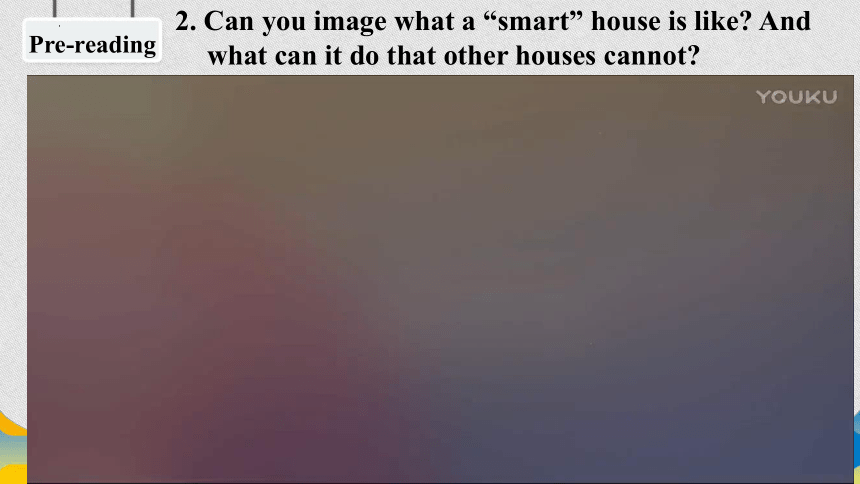
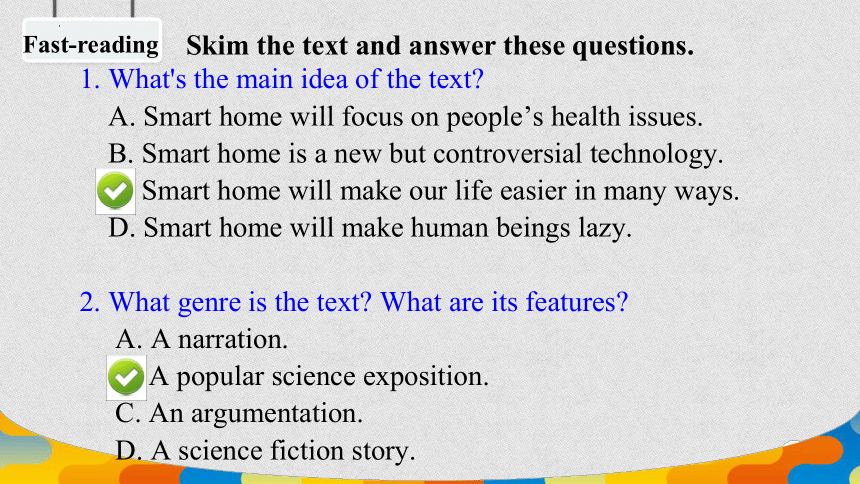
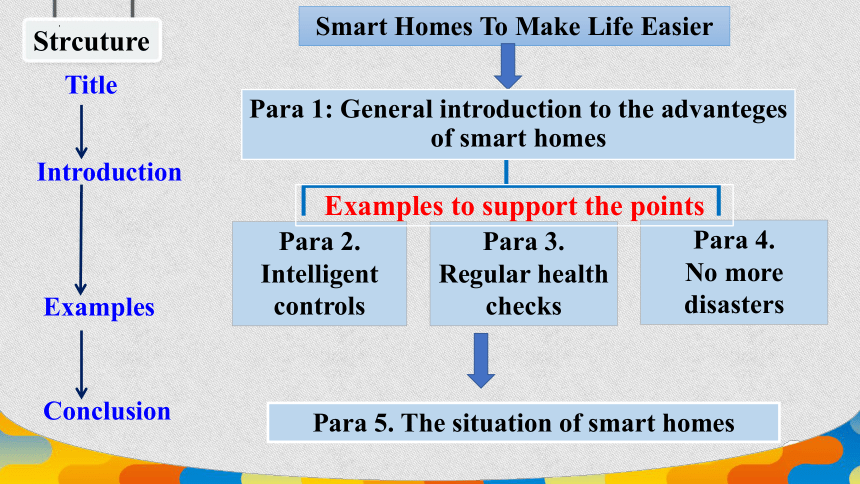
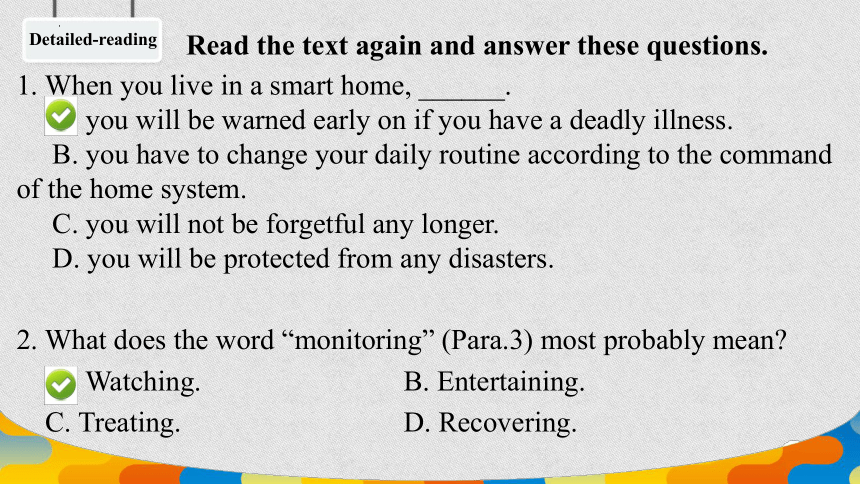
文档简介
(共17张PPT)
Unit 2 LOOKING INTO THE FUTURE
Reading and thinking
Learning Objectives:
1. To learn how smart homes make our life easier.
2. To learn about the advantages and disadvantages of technology in the future.
3. To express your opinions on smart homes.
Discuss these questions in groups.
1. What does it mean when we say that something such as a phone is “smart” Do you have any “smart” things
Something has a “brain” like a human being. It can “think” and do what its owner wants to do.
Pre-reading
2. Can you image what a “smart” house is like And what can it do that other houses cannot
Pre-reading
Fast-reading
Skim the text and answer these questions.
1. What's the main idea of the text
A. Smart home will focus on people’s health issues.
B. Smart home is a new but controversial technology.
C. Smart home will make our life easier in many ways.
D. Smart home will make human beings lazy.
2. What genre is the text What are its features
A. A narration.
B. A popular science exposition.
C. An argumentation.
D. A science fiction story.
Para 2.
Intelligent controls
Para 3.
Regular health checks
Para 4.
No more disasters
Para 5. The situation of smart homes
Smart Homes To Make Life Easier
Para 1: General introduction to the advanteges of smart homes
Title
Introduction
Examples
Conclusion
Examples to support the points
Strcuture
Detailed-reading
1. When you live in a smart home, ______.
A. you will be warned early on if you have a deadly illness.
B. you have to change your daily routine according to the command of the home system.
C. you will not be forgetful any longer.
D. you will be protected from any disasters.
2. What does the word “monitoring” (Para.3) most probably mean
A. Watching. B. Entertaining.
C. Treating. D. Recovering.
Read the text again and answer these questions.
3. What does the word“short” in the 4th paragraph mean
A. 短 B. 短路 C. 短缺 D. 短处
4. What do we know about this smart technology from the last paragraph
A. It is a fantasy at present.
B. It has already been used widely.
C. It is being used in some homes.
D. It will never be realized.
5. What is the writer's attitude towards smart homes
A. Doubtful B. Confident C. Unclear D. Opposed
Detailed-reading
Para. 1
Have you ever forgotten to lock the door of your house Or, have you ever forgotten to switch off the TV or computers These kinds of things happen to us all the time, waste resources, and can sometimes lead to problems. However, in the not-too-distant future, we will be living in smart homes that will lock the door for us when we are away and remember to switch off the TV when we forget. These smart homes will keep us secure, save us energy, and provide a more comfortable environment to live in.
1. Why does the writer start the paragraph with two questions
2. What does “these kind of things” refer to
3. What are the advantages of smart homes mentioned in this passage
Because the writer wants to arouse readers’ interest or attention.
Keep us secure; Save us energy; Provide a more comfortable environment to live in.
Some inconvenience people may have in ordinary homes.
Para. 2
Today, we have to use switches for our lights, knobs for our applians and remote controls for our TVs and air conditioners. In the future, we will be using advanced technology every day for automatic control of just about everything in our home. The future home will use integrated sensors to tell when you leave home each morning, and then go into an energy-efficient mode all by itself. You will no longer have to think about turning switches on and off yourself. Your home will also learn your daily routine and preferences, so everything will be ready for you when you get home each evening. Your lights will come on the instant you enter the door and along with your favourite music or TV programmes, and you will find your dinner already prepared for you. All controls will respond to voice commands, so if you want to change your routine, you just say aloud what you want and the home system will obey.
1. How do we control things in our home in the future
2. How does it work
1) use___________sensors to tell when you leave and go into an evergy-efficient mode all by__________.
2) learn your daily__________and____________. Everything will be_________when you get home.
3) All controls will respond to________________.
automatic control
integrated
itself
routine
preferences
ready
voice commands
Para. 3
In addition, your smart home will be monitoring your health for you every day. Your bed, for example, will record how well you sleep every night. It will also be checking your body weight. If you start to have sleep or weight problems, it will send a warning to your phone. It will also give you suggestions on a healthier diet and how to sleep better. Smart toilets will be keeping constant track of your health as well. They can warn you early on if there is something abnormal or if you have a critical illness, such as cancer, and potentially save your life.
1. Why does the paragraph start with “In addition”
2. What do you think “regular health checks” are
It shows Paragraph 2 and Paragraph 3 are parallel paragraphs.
sleep, body weight, diet and illness.
Para. 4
No More Disasters
Smart home will be able to prevent serious damage from accidents. For example, if a water pipe starts leaking, of if there is a short in the electrical wiring, your smart home will detect it and provide you with the relevant information. This way, you will be able to fix the problem before your home becomes flooded or catches fire.
What does the writer want to convery by describing how smart homes prevent serious damage from accidents
The writer wants to convey that smart homes are much safer than ordinary homes.
doors dinners
TVs, computers beds
water pipes, electric wires toilets
lights, favourite music, or TV programmes lock the door for us when we are away
prepare dinner for us
switch off the TVs and computers when we forget
record how well we sleep every night; check our body weight;
come on the instant you enter the room
detect the problem and provide us with relevant information
keep constant track of our health and warn us early on if there is something wrong
What wan smart homes do for us
Para. 5
This smart technology is not a fantasy. Many of these new innovations are already available and being used in some homes. In this sense, the home of tomorrow is already the home of today. Nevertheless, it will take some years before most new homes begin to use this new technology.
What does the underlined sentence mean
A. Most homes have been equipped with this new technology.
B. Many new innovations are being used in most homes.
C. The home of today is as perfect as the home of tomorrow.
D. The new technology that will be brought to use in most homes in the near future is already being used in some homes.
What might be some of the disadvantages of smart homes
Post-reading
Test for goals
In the near future, the smart 1._______(home) with new technology will solve many daily problems for us. We will be using 2._________(advance)technology every day for automatic control of everything. All controls will respond 3.______ our voice commands and prepare everything for us according to our 4.______ (day) routine. In the meantime, regular health checks 5.__________________ (monitor) our health every day and give us a warning early 6._____ if there is something abnormal, which 7.__________(potential) save our lives. In addition, by 8. (detect)abnormal signs in our homes, smart homes will provide us with the relevant information, so we will be able 9. (fix) the problem in time. Many of these new innovations are already 10.__________ (avail) and being used in some homes, and most new homes will begin to use this new technology in the not-too-distant future.
homes
advanced
to
daily
will be monitoring
on
potentially
detecting
to fix
available
Good Bye
Miss Ye
Unit 2 LOOKING INTO THE FUTURE
Reading and thinking
Learning Objectives:
1. To learn how smart homes make our life easier.
2. To learn about the advantages and disadvantages of technology in the future.
3. To express your opinions on smart homes.
Discuss these questions in groups.
1. What does it mean when we say that something such as a phone is “smart” Do you have any “smart” things
Something has a “brain” like a human being. It can “think” and do what its owner wants to do.
Pre-reading
2. Can you image what a “smart” house is like And what can it do that other houses cannot
Pre-reading
Fast-reading
Skim the text and answer these questions.
1. What's the main idea of the text
A. Smart home will focus on people’s health issues.
B. Smart home is a new but controversial technology.
C. Smart home will make our life easier in many ways.
D. Smart home will make human beings lazy.
2. What genre is the text What are its features
A. A narration.
B. A popular science exposition.
C. An argumentation.
D. A science fiction story.
Para 2.
Intelligent controls
Para 3.
Regular health checks
Para 4.
No more disasters
Para 5. The situation of smart homes
Smart Homes To Make Life Easier
Para 1: General introduction to the advanteges of smart homes
Title
Introduction
Examples
Conclusion
Examples to support the points
Strcuture
Detailed-reading
1. When you live in a smart home, ______.
A. you will be warned early on if you have a deadly illness.
B. you have to change your daily routine according to the command of the home system.
C. you will not be forgetful any longer.
D. you will be protected from any disasters.
2. What does the word “monitoring” (Para.3) most probably mean
A. Watching. B. Entertaining.
C. Treating. D. Recovering.
Read the text again and answer these questions.
3. What does the word“short” in the 4th paragraph mean
A. 短 B. 短路 C. 短缺 D. 短处
4. What do we know about this smart technology from the last paragraph
A. It is a fantasy at present.
B. It has already been used widely.
C. It is being used in some homes.
D. It will never be realized.
5. What is the writer's attitude towards smart homes
A. Doubtful B. Confident C. Unclear D. Opposed
Detailed-reading
Para. 1
Have you ever forgotten to lock the door of your house Or, have you ever forgotten to switch off the TV or computers These kinds of things happen to us all the time, waste resources, and can sometimes lead to problems. However, in the not-too-distant future, we will be living in smart homes that will lock the door for us when we are away and remember to switch off the TV when we forget. These smart homes will keep us secure, save us energy, and provide a more comfortable environment to live in.
1. Why does the writer start the paragraph with two questions
2. What does “these kind of things” refer to
3. What are the advantages of smart homes mentioned in this passage
Because the writer wants to arouse readers’ interest or attention.
Keep us secure; Save us energy; Provide a more comfortable environment to live in.
Some inconvenience people may have in ordinary homes.
Para. 2
Today, we have to use switches for our lights, knobs for our applians and remote controls for our TVs and air conditioners. In the future, we will be using advanced technology every day for automatic control of just about everything in our home. The future home will use integrated sensors to tell when you leave home each morning, and then go into an energy-efficient mode all by itself. You will no longer have to think about turning switches on and off yourself. Your home will also learn your daily routine and preferences, so everything will be ready for you when you get home each evening. Your lights will come on the instant you enter the door and along with your favourite music or TV programmes, and you will find your dinner already prepared for you. All controls will respond to voice commands, so if you want to change your routine, you just say aloud what you want and the home system will obey.
1. How do we control things in our home in the future
2. How does it work
1) use___________sensors to tell when you leave and go into an evergy-efficient mode all by__________.
2) learn your daily__________and____________. Everything will be_________when you get home.
3) All controls will respond to________________.
automatic control
integrated
itself
routine
preferences
ready
voice commands
Para. 3
In addition, your smart home will be monitoring your health for you every day. Your bed, for example, will record how well you sleep every night. It will also be checking your body weight. If you start to have sleep or weight problems, it will send a warning to your phone. It will also give you suggestions on a healthier diet and how to sleep better. Smart toilets will be keeping constant track of your health as well. They can warn you early on if there is something abnormal or if you have a critical illness, such as cancer, and potentially save your life.
1. Why does the paragraph start with “In addition”
2. What do you think “regular health checks” are
It shows Paragraph 2 and Paragraph 3 are parallel paragraphs.
sleep, body weight, diet and illness.
Para. 4
No More Disasters
Smart home will be able to prevent serious damage from accidents. For example, if a water pipe starts leaking, of if there is a short in the electrical wiring, your smart home will detect it and provide you with the relevant information. This way, you will be able to fix the problem before your home becomes flooded or catches fire.
What does the writer want to convery by describing how smart homes prevent serious damage from accidents
The writer wants to convey that smart homes are much safer than ordinary homes.
doors dinners
TVs, computers beds
water pipes, electric wires toilets
lights, favourite music, or TV programmes lock the door for us when we are away
prepare dinner for us
switch off the TVs and computers when we forget
record how well we sleep every night; check our body weight;
come on the instant you enter the room
detect the problem and provide us with relevant information
keep constant track of our health and warn us early on if there is something wrong
What wan smart homes do for us
Para. 5
This smart technology is not a fantasy. Many of these new innovations are already available and being used in some homes. In this sense, the home of tomorrow is already the home of today. Nevertheless, it will take some years before most new homes begin to use this new technology.
What does the underlined sentence mean
A. Most homes have been equipped with this new technology.
B. Many new innovations are being used in most homes.
C. The home of today is as perfect as the home of tomorrow.
D. The new technology that will be brought to use in most homes in the near future is already being used in some homes.
What might be some of the disadvantages of smart homes
Post-reading
Test for goals
In the near future, the smart 1._______(home) with new technology will solve many daily problems for us. We will be using 2._________(advance)technology every day for automatic control of everything. All controls will respond 3.______ our voice commands and prepare everything for us according to our 4.______ (day) routine. In the meantime, regular health checks 5.__________________ (monitor) our health every day and give us a warning early 6._____ if there is something abnormal, which 7.__________(potential) save our lives. In addition, by 8. (detect)abnormal signs in our homes, smart homes will provide us with the relevant information, so we will be able 9. (fix) the problem in time. Many of these new innovations are already 10.__________ (avail) and being used in some homes, and most new homes will begin to use this new technology in the not-too-distant future.
homes
advanced
to
daily
will be monitoring
on
potentially
detecting
to fix
available
Good Bye
Miss Ye
